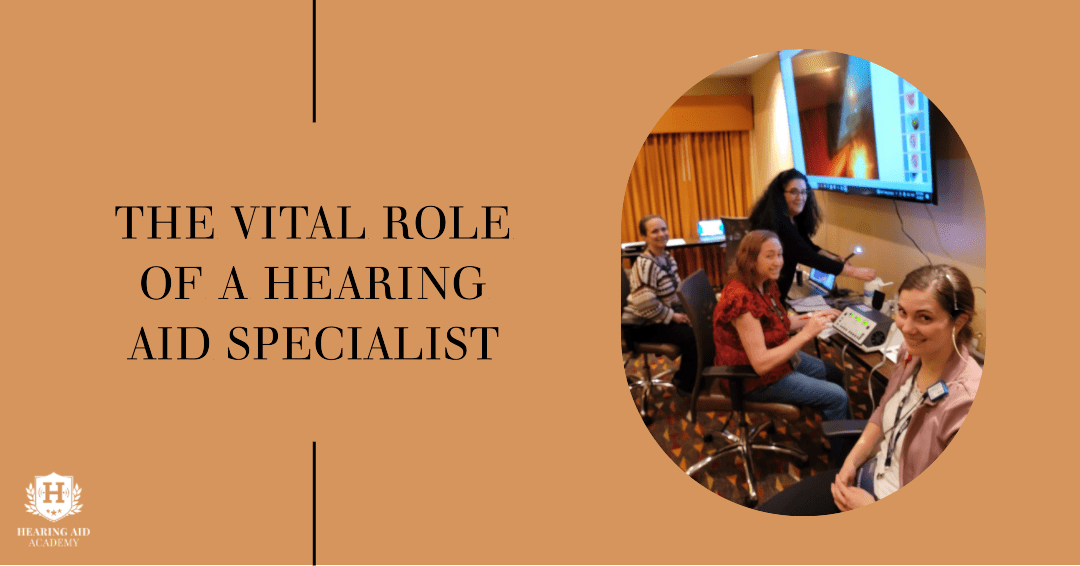If you’re one of the estimated 48 million Americans dealing with some degree of hearing loss, you know that it can make it difficult to enjoy everyday life. From missing out on conversations with family and friends to having trouble hearing in noisy environments, hearing loss can create barriers to daily living.
But don’t despair! You don’t have to let your hearing issues limit what you can do. With the help of a specialized professional known as a hearing-aid specialist, you can get back to enjoying life again. The best part? This specialized profession isn’t just for those who already have difficulty hearing; it’s also for anyone looking to prevent future hearing loss.
In this article, we’ll explain the vital role that a hearing-aid specialist plays in treating and preventing hearing loss. We’ll discuss the various tests and treatments they provide as well as the qualifications needed to become a qualified Hearing Aid Specialist. By the end, you’ll have a better understanding of why these professionals are critical for those dealing with or at risk of developing hearing loss.
Diagnosing Hearing Loss and Determining Treatment
If you have been experiencing difficulties with your hearing, the first stop is to a hearing specialist. They are the professionals who specialize in diagnosing and treating hearing loss.
A hearing aid specialist plays an important role in identifying and diagnosing the type of hearing loss you may be suffering from. Once this diagnosis is made, they can then discuss with you the best treatment plan for your individual needs. This plan may involve a variety of steps, including:
- Getting fitted for a hearing aid or other assistive device
- Performing cochlear implants
- Adjusting device settings to ensure optimal sound quality
- Teaching appropriate use of devices used for treating hearing loss
- Providing ongoing counseling on how to best manage your individual circumstances
It’s only with the help of a qualified professional that you can receive an accurate diagnosis and develop an effective treatment plan. That’s why it’s so important to make sure that you find a competent hearing aid specialist who can provide personalized care and guidance.
Selecting and Fitting the Right Hearing Aids

When it’s time to choose the right hearing aids for your needs, a hearing aid specialist should be your go-to choice. Hearing aids come in all kinds of shapes and sizes, from behind-the-ear models to in-the-ear versions and more. The professional expertise of a hearing aid specialist can help you make the best selection, based on your lifestyle and budget.
Once the right hearing aids have been chosen, it’s time for fitting and fine tuning. The specialist will adjust the hearing aids until they fit comfortably and securely in place. Then, they will give you a demonstration of how to use them correctly so that you’re maximizing their effectiveness right from the start.
Finally, they may show you how to change the battery when needed and perform any cleaning or maintenance of the model that’s recommended by the manufacturer. With all these steps completed, you will be ready to enjoy improved sound quality and clarity with less effort on your part!
Programming and Adjusting Hearing Aids to Meet Unique Needs
When it comes to your hearing aid, you want it to be perfect for you. That’s why a hearing aid specialist is so important in making sure your device fits just right.
You see, a hearing aid specialist can help you with the programming and adjusting of your device, ensuring that it is customized for your unique needs. They will also take the time to answer any questions you may have and help you become comfortable with using the device.
- Adjustment and Fitting
The specialist will adjust the settings and fit of the device to make sure it fits properly on your ear. This includes taking into account factors such as:
- Ear size, shape, and skin condition
- Ear anatomy
- Accuracy of mold
- Sound levels that will be comfortable to wear
- Listening preferences
- Communication needs
- Lifestyle choices
All these factors play a role in making sure that your hearing aid fits comfortably on your ear without irritating it or causing it discomfort.
- Programming
Hearing aids can be fine-tuned for many different settings, including background noise levels, treble/bass levels, directivity preferences, noise reduction settings, volume control sensitivity, feedback management settings and more. A hearing aid specialist is able to assess your needs accurately and program the device accordingly so that it can provide maximum benefit for you.
Providing Counseling and Education on Hearing Loss

You may not be aware of all the benefits offered by a hearing aid specialist. One important role they play is providing counseling and education on hearing loss.
This could involve helping you understand the type of hearing loss you have, discussing the potential causes of your hearing loss, delving into lifestyle factors that can affect it, and providing recommendations for ways to improve your quality of life.
A Hearing Aid Specialist can also help you with:
- Finding out if a hearing aid is right for you
- Exploring the different types of hearing aids available
- Learning how to adjust to wearing a hearing aid
- Understanding how to best use and care for your device
- Explaining any insurance or financial options available when purchasing a new or replacement device
The valuable counseling that a Hearing Aid Specialist can offer will make it easier to cope with your condition, manage any changes in your lifestyle, and make well-informed decisions about how best to manage a hearing loss diagnosis.
Conducting Follow-Up Care and Maintenance
Ongoing maintenance and follow-up care are crucial to ensure that you maintain your hearing health and keep your hearing aid functioning properly. That’s why access to a hearing aid specialist is so important. These experts are specially trained to provide the necessary maintenance and follow-up care on your hearing aid.
The role of a hearing aid specialist includes:
- Helping you select the most suitable hearing aids for your needs
- Teaching you how to use and take care of the hearing aids
- Conducting regular checkups to test the accuracy, fit, and performance of the devices
- Answering any questions or concerns about hearing loss or hearing aids
- Cleaning, reconditioning, and repairing existing devices
Reprogramming Your Device If Necessary
Whether you’ve just been fitted with a new device or are an experienced user who requires some adjustments, having access to an experienced Hearing Aid Specialist ensures that you get the best possible care for your needs. This specialized care can make all the difference in ensuring effective use of a hearing aid and long lasting benefits from it.
Conclusion
Choosing a hearing aid specialist to help with hearing loss can be a daunting task. It’s important to research different specialists, ask questions, and consider what services they offer. A hearing aid specialist can provide invaluable expertise and guidance when it comes to finding a hearing aid that works for you.
In addition to providing hearing aids, a hearing aid specialist can also help you manage any hearing loss-related issues and keep track of your progress. They can also help you make better decisions when it comes to hearing health care, so you can get the best possible outcome.
To best manage and treat hearing loss, it’s important to work with a hearing aid specialist. Their expertise, knowledge, and guidance can help you find a hearing aid that is right for you and make sure that you are getting the best possible treatment.


